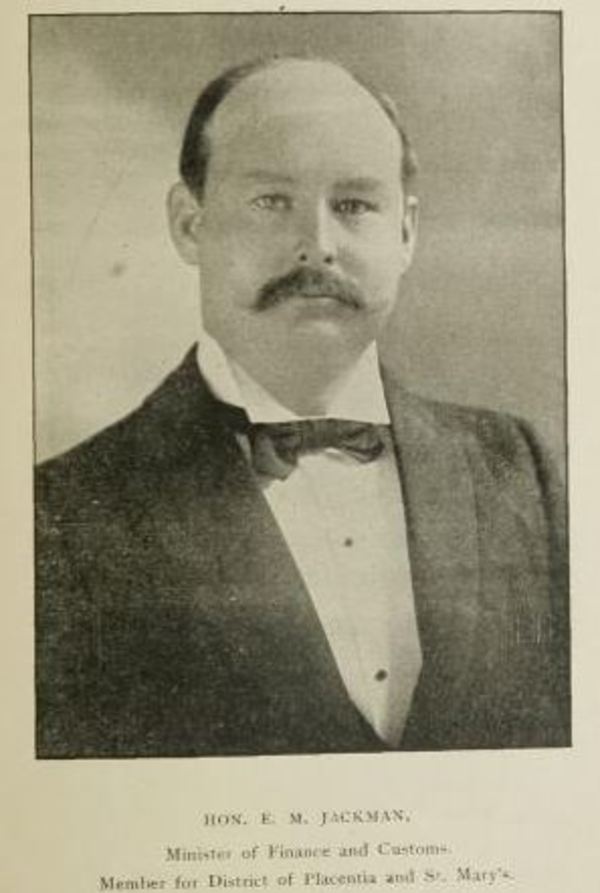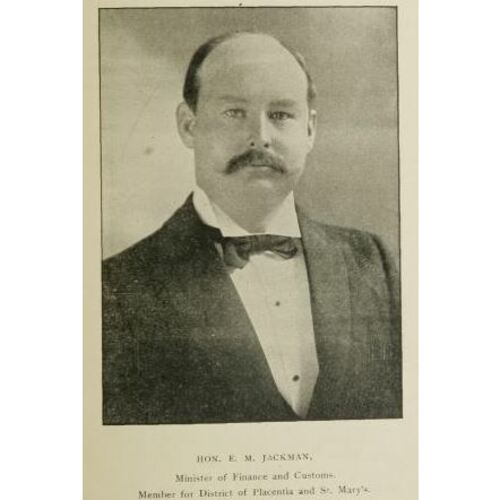
Source: Link
JACKMAN, EDWARD MICHAEL, businessman and politician; b. 29 Feb. 1868 in St John’s, son of Michael Jackman and Margaret Lanigan; m. 8 Sept. 1890 Alice F. Walsh, and they had six sons and one daughter; d. 20 July 1916 in Montreal.
Edward Michael Jackman’s father and uncles Arthur* and William* were well-known sealing captains from Renews, Nfld. Educated in St John’s by the Brothers of the Christian Schools of Ireland, Jackman in 1880 was apprenticed as a tailor there, and he later worked in Boston and New York. Upon returning to St John’s in 1889 he established a tailoring business, which had a workforce of ten the following year. According to an 1894 account of prominent city residents, Ned Jackman was a “hustler,” with boundless energy and organizational skills. His company provided custom tailoring, sold imported gentlemen’s clothing (after 1893), and operated a dry goods business. In the early 1900s it had approximately 50 employees and its own magazine, Jackman’s Review, which contained articles on issues of the day and literary contributions.
In 1910 Jackman attempted to expand by manufacturing ready-made clothing, but the firm became overextended. In 1912 it was reorganized, with Jackman satisfying his creditors. He remained as its managing director, but a son actually oversaw operations. Success was short-lived; in January 1915 the shareholders placed the company in liquidation because of the devastating effect of the war on its fortunes.
Jackman served as president of the tailors’ union in the mid 1890s, and he helped other unions to associate under the auspices of the Mechanics’ Society. In 1900 unionized iron-ore miners at Bell Island chose him as their negotiator in talks that ended their six-week-old strike in July. Prominent in many Catholic social organizations, he became president of the Star of the Sea Association in 1893 and held the presidency until his death. He was also a lifelong member of the Total Abstinence and Benefit Society.
From the early 1890s Jackman was closely identified with the Liberal party led by Sir William Vallance Whiteway* and then Robert Bond*. In 1893 the Liberal government appointed him secretary of the commission charged with establishing a paid fire service for St John’s. In 1900 Jackman successfully contested the district of Placentia and St Mary’s as a Liberal and was appointed minister of finance and customs in the Bond government. He presided over a period of economic prosperity, highlighted by a budget surplus of $125,000 in 1907–8. Jackman negotiated with the Canadian government to resolve tariff difficulties and arranged the establishment of regulations to inspect steamers operating between the two countries. He was defeated in the 1909 election by Francis J. Morris, brother of Sir Edward Patrick Morris*, whose People’s party won the election.
Although an anti-confederate in public, privately Jackman supported closer relations and even union with Canada. In July 1913 he sought financial assistance from Sir Thomas George Shaughnessy*, president of the Canadian Pacific Railway, for a “campaign of education” in favour of confederation in both Newfoundland and Canada. Jackman added that he had made a secret alliance with Morris, a supporter of confederation, who had promised to make him minister of finance should the People’s party win the November 1913 election. Morris was indeed victorious but Jackman did not re-enter colonial politics. In 1914 Morris, however, appointed him to the municipal board that governed St John’s until 1916.
The campaign for confederation never took place, but Jackman’s contacts with Canadian politicians and businessmen proved useful in October 1914, when Newfoundland and Canada were once more in preliminary negotiations on the matter. Morris sent him to meet members of the Conservative government of Sir Robert Laird Borden* in Ottawa, and Jackman remained there until June 1915 carrying on talks. The desire of the Reid Newfoundland Company to sell its railway to Canadian businessmen or the Canadian government was important to the success of the negotiations. In June 1915 William Duff Reid* appointed Jackman his company’s representative, and Jackman quickly achieved an initial agreement between Ottawa and the company. By mid 1916, however, negotiations on confederation had collapsed because of the opposition of William Ford Coaker*, leader of the Union party, whose support was crucial to the scheme. Jackman had in the meantime gone from St John’s to Montreal on business. He became seriously ill and died there on 20 July 1916.
PANL, MG 223, Jackman to T. G. Shaughnessy, 29 Aug. 1913 (mfm.); MG 299. Daily News (St John’s), 22 July 1916. Evening Herald (St John’s), 6 Feb. 1897. Evening Telegram (St John’s), 25–26, 28 July 1900. Amicus, “Honourable E. M. Jackman, minister of finance and customs,” Newfoundland Quarterly (St John’s), 3 (1903–4), no.3: 2. Melvin Baker, “William Gilbert Gosling and the charter: St. John’s municipal politics, 1914–1921,” Newfoundland Quarterly, 81 (1985–86), no.1: 21–28. The book of Newfoundland, ed. J. R. Smallwood et al. (6v., St John’s, 1937–75; vols.1–2 repr. [1968] and 1979), 2: 196–97. J. L. Joy, “The growth and development of trades and manufacturing in St. John’s, 1870–1914” (ma thesis, Memorial Univ. of Nfld, St John’s, 1977). I. D. H. McDonald, “To each his own”: William Coaker and the Fishermen’s Protective Union in Newfoundland politics, 1908–1925, ed. J. K. Hiller (St John’s, 1987), 54–56. Newfoundland men . . . , ed. H. Y. Mott (Concord, N.H., 1894). S. J. R. Noel, Politics in Newfoundland (Toronto, 1971). Who’s who and why, 1912.
Cite This Article
Melvin Baker, “JACKMAN, EDWARD MICHAEL,” in Dictionary of Canadian Biography, vol. 14, University of Toronto/Université Laval, 2003–, accessed February 19, 2026, https://www.biographi.ca/en/bio/jackman_edward_michael_14E.html.
The citation above shows the format for footnotes and endnotes according to the Chicago manual of style (16th edition). Information to be used in other citation formats:
| Permalink: | https://www.biographi.ca/en/bio/jackman_edward_michael_14E.html |
| Author of Article: | Melvin Baker |
| Title of Article: | JACKMAN, EDWARD MICHAEL |
| Publication Name: | Dictionary of Canadian Biography, vol. 14 |
| Publisher: | University of Toronto/Université Laval |
| Year of publication: | 1998 |
| Year of revision: | 1998 |
| Access Date: | February 19, 2026 |



